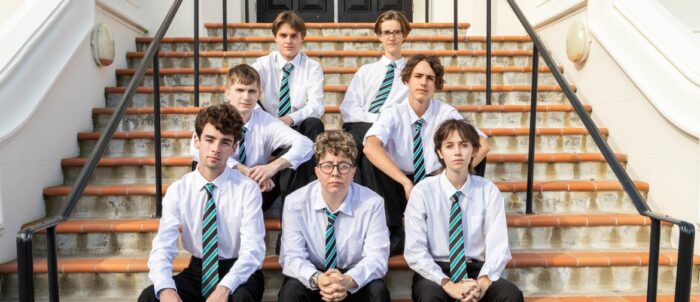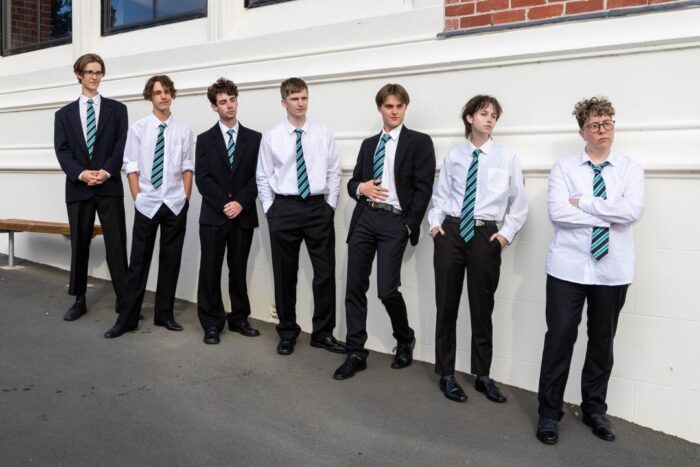The History Boys – Company Theatre – A Fine Night Out
The History Boys – Over there, in a suburb called Belmont (“Belmont?” “Yes it’s that nowhere bunch of shops ‘tween Devonport and Hauraki Corner, daahling”) lies a theatre called the Rose Centre, in which the semi-pro Company Theatre stages several productions each year. (Coming up next in quick succession they have Death of a Salesman, Cat on a Hot Tin Roof, and bedroom farce Boeing-Boeing.)
The History Boys – Company Theatre
At Rose Centre Belmont, until May 20
Directed by Suzy Sampson
Tonight (and until May 20) they deliver Alan Bennett’s award-winning 2004 play of schooling and sexuality, ‘History Boys,’ a challenging production for any team, especially since the ‘boys,’ all thirsting for scholarship success, must of necessity be young. Or appear so.
Several tonight are students at Devonport Drama, a boutique youth theatre run by Geoff Allen. He clearly prepares his performers well. They do deliver.
Bennett’s play premiered at the Royal National Theatre in London back in 2004, and then on Broadway two years later, and has gone on to conquer the English-speaking world. They’ve even made a film of it. An examination of what have become the playwright’s common themes — snobbery and sarcasm; knowledge and learning; and sexuality, especially homosexuality — ‘History Boys’ has been all-conquering, winning multiple awards, including the 2005 Laurence Olivier Award for Best New Play and the 2006 Tony Award for Best Play.
Like much of Bennett’s work, it is semi-autobiographical. He is said to have based the main character on one of his teachers, and the sexually-troubled student Posner on himself. And the plot itself is spun out of his own guilt at “cheating” (his term) his way to an Oxford scholarship success himself, having “crafted” his examination answers to give the examiners what they wanted. The guilt he felt for 50 years inspired the play’s creation, “both a confession and expiation for I feel was, in effect, a confidence trick.”
Bennett is a famous hand-wringer.
As an examination itself, it questions rather than answers. The questions spilled over into the post-show lobby where debate was raging freely. Bennett would surely be proud. (And for at least one of the dramatic personae, this would have been in character.)
And the night wasn’t without its own form of comedy either. But as director Suzy Sampson says, “how does one keep the comedy in a play where the lead character behaves so badly without appearing to condone that behaviour?” To say more would be to spoil the story.
The play has many challenges for the team, and the talented (mostly) young cast, to which they (mostly) rose. It’s already long (and has been felicitously trimmed), and the material is sexually challenging and fiendishly literate, especially for a young cast. That they rose to it is a tribute to them all.
We are given two poles, two approaches to education, shown to be in conflict — teaching for the genuine love of knowledge — or teaching literature, poetry and history simply as a bag of tricks, to pass exams or to deliver “gobbets’ of knowledge to impress. (“And thus spake the wise man, etc.” ~ Nietzsche)
The two main characters represent the two main poles, both behaving badly. Moderating, mediating between them is both an older and more corporate pedagogy: we teach facts as facts – and/or we teach to categorise and measure. Schooling as the near-equivalent of a pub quiz.
The plot is driven — or, perhaps, better said, perambulated by — the subjunctive mode; (pay attention now, I’m being obtuse to avoid more spoilers) … by what becomes a conflicted desire for educational advancement and exam success — a success that makes imbibing knowledge more for impressing others than for the love of it.
Subjunctive? That is: “relating to or denoting a mood of verbs expressing what is imagined or wished or possible.” If you think that might encompass sex done badly, you would also be right. Who but Bennett could transform ‘Fowler’s Modern English Usage’ into high art?
And not just high, but entertaining art. There’s a reason the play is much-staged, and well filmed. As The Guardian wrote, “it is one of the most provocatively funny debates ever conceived about what education is for and who is entitled to it.”
There are weaknesses in one or two of the cast — one them crucial. And too much 80s pop for mine (but how else to best signal the time period of the play?) But let’s not carp: this is top drama done well. You owe it to yourself to go.
Don’t take your maiden aunt. She’ll be shocked. Or anyone else frightened by bad language. But anyone less frigid or frumpy will be delighted by the night.
Comedy? Who needs the stand-up form when you have words and wit and character-driven drama that oozes meaning.
A fine night of theatre all round.
THEATRE PETER


